Revealed: AFL has stationed independent doctors in review bunker to monitor concussions during games
The AFL’s review system is being used for more than goal-line decisions, with revelations the league is stationing doctors in the bunker during games to monitor players who suffer head knocks.
AFL
Don't miss out on the headlines from AFL. Followed categories will be added to My News.
Independent doctors are being stationed in the AFL’s goal review bunker to monitor for signs of concussion that have been missed by club medicos.
The Herald Sun can reveal plans for this year’s “medical spotter program” were detailed to clubs in a pre-season meeting hosted by AFL chief medical officer Michael Makdissi.
The independent doctors, sitting in the ARC bunker at AFL House that is loaded with TV camera angles, can ping messages to club doctors sitting on the interchange bench via a Hawkeye.
Watch every blockbuster AFL match this weekend Live & Ad-Break Free In-Play on Kayo. New to Kayo? Try 14-Days Free Now >
“Michael … confirmed that doctors will receive more regular message notifications via the Hawkeye tablet if a sign of concussion has been flagged and not actioned by the club doctor,” a leaked email documenting the minutes from that March meeting said.
“Michael noted that the threshold for sending notifications from ARC to Hawkeye tablet is high.
“If notification is received, doctors should submit a HIAF (Head Injury Assessment Form) at the very least and have a low threshold to complete a SCAT5 (concussion test)
“Doctors should respond to the message to confirm it was received.”
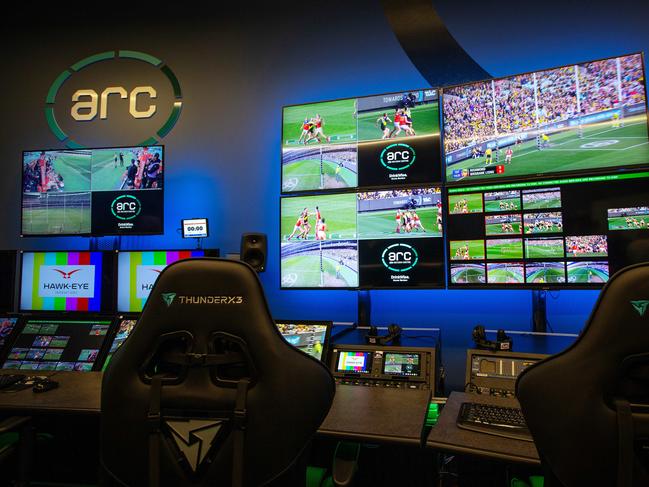
The AFL confirmed the ‘medical spotter’ program – which started in 2020 – was in place for all matches.
“We take concussion and the protection of the brain health of all those playing our game extremely seriously,” spokesman Jay Allen told the Herald Sun.
“Since 2020, a ‘spotter’, who is also a doctor, has been stationed in the ARC for AFL matches.
“The ‘spotter’ has access to multiple broadcast angles and the role is to identify any potential missed collision and / or signs consistent with a possible concussion.
“The club doctor can be notified immediately on the bench through the Hawkeye tablets messaging system.
“The club doctors are then prompted (in the relatively rare event of them having missed the incident) to undertake the appropriate medical evaluation of the player.
“The ‘spotter’ is very much an additional set of eyes provided by the AFL to assist club doctors.
“The club doctor is in charge of assessing the player’s medical condition. The AFL will continue to invest in this area to provide further support for clubs.”
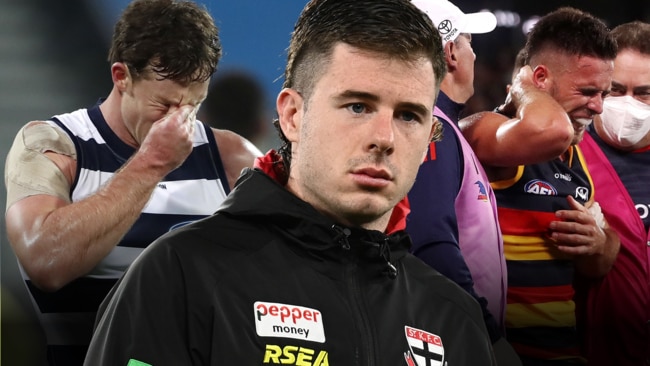
It’s understood the league experimented by placing unidentified doctors in the crowd as spotters pre-Covid, with the AFL’s involvement in concussion management growing.
Most club doctors initially resisted because they felt they knew their patients best.
But there is rising support for the AFL to take control of concussions because it would offer clubs greater legal coverage.
Concussion campaigner Peter Jess called for the league to handover the medical spotter’s weekly reports.
“Where are the concussion spotters’ reports? That’s the first thing that we want to have a look at,” Jess said.
Jess’ website, Concussion Watch, claims there were 58 concussions in the first 10 rounds.
Jess said Jack Higgins (St Kilda), Jed Bews (Geelong), Anthony Scott (Western Bulldogs) and Lachlan Murphy (Adelaide) should consider sitting out the rest of the season after suffering multiple concussions.
Call for criminal proceedings over AFL’s concussion protocols
—Simeon Thomas-Wilson
The safety of the AFL’s return to play protocols and concussion regimen is set to come under a new review.
WorkSafe Victoria’s long-running investigation into the league’s concussion protocols is to be forwarded to the Office of Public Prosecutions on Wednesday.
Under the Occupational Health and Safety Act, if WorkSafe has not commenced proceedings within nine months then the investigation can be referred to the Director of Public Prosecutions Kerri Judd QC.
Concussion campaigner Peter Jess, who first requested WorkSafe investigate how the AFL has handled concussions in 2019, said he hoped the referral to the DPP would task “properly qualified experts” to review the AFL’s concussion protocols.
The Herald Sun revealed in March that Dr Andrew Gardner, a Newcastle University psychologist and a member of the AFL’s scientific committee, and biomechanics expert Dr Andrew McIntosh were the consultants employed by WorkSafe to review the AFL’s management of concussions.
WorkSafe has refused to release multiple reports compiled by the two into the AFL’s concussion protocols.
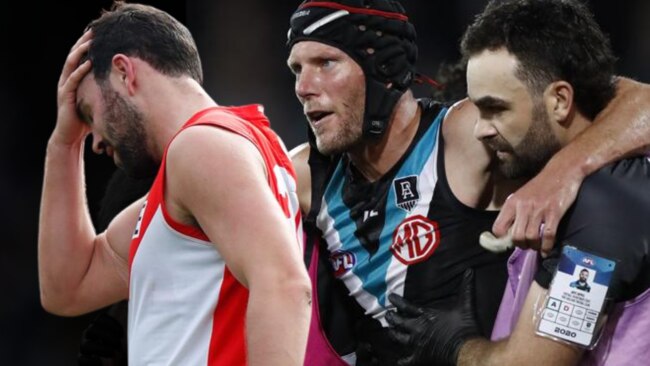
Jess said the AFL’s protocols needed to be reviewed by brain trauma experts.
“The basis of the request for prosecution is to have a genuine analysis for suitably qualified medical and scientific professionals into the return to play protocols being safe or not,” he said.
“A concussion is a traumatic brain injury, it therefore defies logic as to why you would have an investigation run by two people whose expertise is not in the field of traumatic brain injury.
“In regards to the AFL I’m not arguing that they should be penalised, I’m arguing that we should have rule changes to protect the players.
“In the 2021 season we had 104 confirmed traumatic brain injuries and that trend has continued into the 2022 season where up to Round 10 58 traumatic brain injuries had been recorded.
“Clearly we need to focus on prevention and mitigation and set targets for reductions of brain trauma, rather than simply accept that this is a by-product of our game.
“Unlike soccer and rugby the AFL and NRL are governed locally and can change the rules without outside interventions.”
WorkSafe’s investigation will continue while the OPP conducts its review.
The AFL has changed its time frame a concussed player must sit out for from at least six to at least 12 days.
In its annual injury report on Friday executive general manager football operations Andrew Dillon said the league’s concussion guidelines are “the most stringent concussion protocols in Australian sport”.
“And we are committed to continuing to listen and learn and take action – both at the elite and community level – when dealing with concussion,” he said.
The league has commissioned an independent review into its chief concussion adviser Paul McCrory after damaging allegations against him surfaced earlier this year.
In March The Herald Sun published a series of allegations from former AFL players now questioning McCrory’s treatment for their concussions in recent years
Concussion experts butt heads over AFL helmet stance
—Jon Ralph
A concussion adviser linked to the AFL says the use of padded headgear could be a way to reduce concussions across football.
The contentious stance is raised by Dr Andrew McIntosh in an article in the Australian Medical Journal and contrasts with the AFL’s own stated position there is no evidence helmets prevent concussion or any other brain injuries.
McIntosh is one of two experts employed by WorkSafe Victoria to review the league’s concussion management as part of a long-running complaint from concussion campaigner Peter Jess into the league’s “return to play’’ protocols.
The former research associate of Dr Paul McCrory, who was the AFL’s chief concussion expert, has advised the league as a member of the International Concussion in Sport Group.
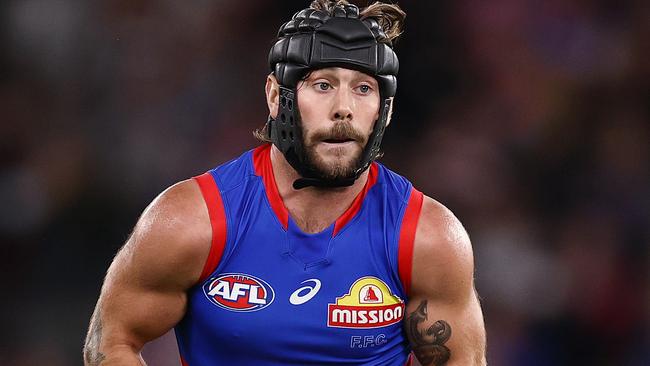
McIntosh used the article this week in the Medical Journal of Australia to deny a conflict of interest with the AFL, which was alleged by associate professor Michael Buckland, who operates the Australian Sports Brain Bank.
“There is clearly a need for continued high quality research on multiple topics such as recovery and susceptibility to repeat concussion,” McIntosh writes.
“In my opinion it is also important that (the) Australian Football League and the Rugby football codes grasp the opportunity to reduce concussion through better performing padded headgear.
“Within the time frame from 1994 to 2022 debate over CTE has arrived late and is informed so far by weak and confounded evidence. The changes that are suggested by concerns regarding CTE are profound for sport and health. Therefore a continued focus on preventing and managing concussion, coupled with high quality research, is sensible and may minimise medium to long-term neurological disease.“
The AFL’s 2021 Community Concussion Guidelines state: “There is no definitive scientific evidence that helmets prevent concussion or other brain injuries in Australian football. Helmets may have a role in the protection of players on return to play following specific injuries (e.g. face or skull fractures).
“Overall, however there is insufficient scientific evidence to make a recommendation for the use of helmets for the prevention of concussion in Australian football.”
AFL spokesman Jay Allan told the Herald Sun last night: “Protecting the health and wellbeing of all people who participate in our game is the highest priority for the AFL and we take concussion and the health of all those playing our game extremely seriously.”
McIntosh wrote of CTE that there were varied views on available evidence linking brain injury as one of the factors for late-onset dementia and Alzheimers disease.
“That is certainly the case with regards to CTE where the quality of evidence is limited, historical measurement of head impact exposure is non-existent and the presence of other risk factors may be unknown,” he wrote.
Tuck inquest: widow’s plea over ex-AFL concussion adviser
— Michael Warner
The widow of Richmond hardman Shane Tuck is demanding a Coroners Court investigation into her husband’s death examine “extremely serious” revelations about the AFL’s handling of concussions.
Katherine Tuck has expressed dismay at the progress of the inquest, which is examining whether repeated head knocks playing football contributed to Tuck’s 2020 suicide.
In a plea to Coroner John Cain, Ms Tuck’s lawyers assert that his probe “must be considerably widened” to investigate the conduct of embattled ex-AFL concussion adviser Prof Paul McCrory.
McCrory is being investigated by an independent AFL-appointed panel over allegations of plagiarism and claims he treated several league concussion victims while serving an agreed medical ban.
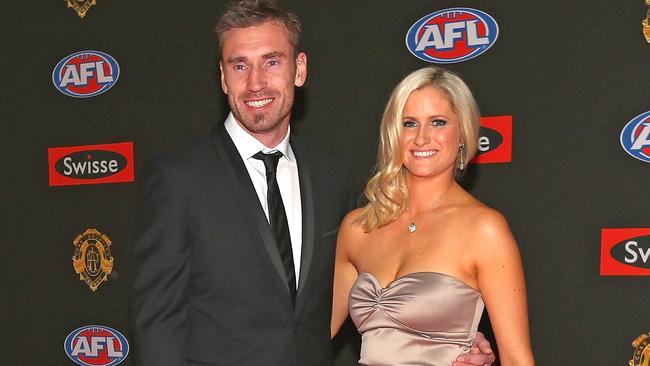
But Ms Tuck’s lawyers say they want answers on “the state of knowledge of the AFL, as to his conduct, at various times from 1994 onwards”.
“The timeline is of great significance,” the letter from counsel Greg Griffin says.
“The AFL have asserted on numerous occasions that the Concussion in Sports Group, chaired by Prof McCrory, was the leading body advising sporting bodies around the world, and providing them with blueprints on how to manage concussions.”
Griffin contends that the AFL’s own “independent investigation” into McCrory “will be futile unless the AFL’s knowledge is also investigated”.
“In our respectful submission, the court should completely disregard the fact an independent review has been established by the AFL,” he says.
“As is patently obvious while the review may be of benefit to the AFL it cannot be of any benefit whatsoever in respect of the matters which ought to be the subject of the coronial investigation.”
Revelations head knock victims such as former Gold Coast and Melbourne player Kade Kolodjashnij had continued to be treated by McCrory despite his medical ban should also be explained, Griffin said.
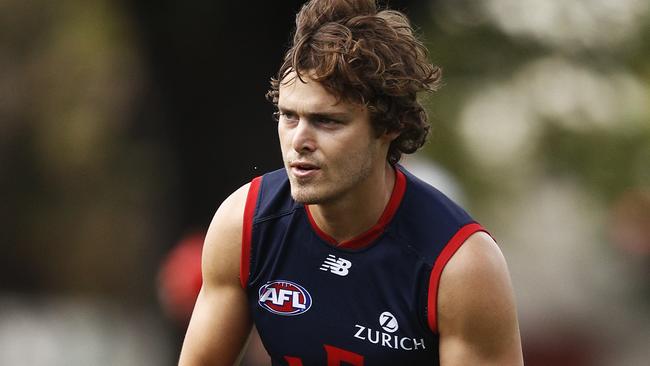
“In light of the seriousness of the allegations, our client, the widow of the deceased, had assumed that a directions hearing would have been set,” he said.
“(Ms Tuck) has instructed us to again request that the State Coroner urgently list this matter for a directions hearing.”
The Tuck camp have also asked Coroner Cain to “consider the question of an order for costs” against AFL “to recompense our client”.
The probe into the death of Tuck has dragged on for almost two years with Ms Tuck already facing legal costs of more than $200,000.
“Effectively, much of the last two years will have been wasted because of the AFL reliance upon Prof McCrory,” Griffin says.
Tuck took his own life in July 2020 and was later diagnosed with Stage III CTE, the devastating degenerative brain disease linked to repeated head knocks. He was 38.
Tuck played 173 games for Richmond between 2004 and 2013.
The league has commissioned an independent review into McCrory’s conduct and entire body of work for the AFL while working at the Florey Institute.
AFL chief executive Gillon McLachlan has previously stated all of the advice McCrory gave the league to inform its policies will also be reviewed.
“(It will probe) the papers he has done, and the research as well as the specific individual advice. It is going to be reviewed. It will be comprehensive,” McLachlan said.
Don’t go it alone. Please reach out for help.
Lifeline: 13 11 14 or lifeline.org.au




